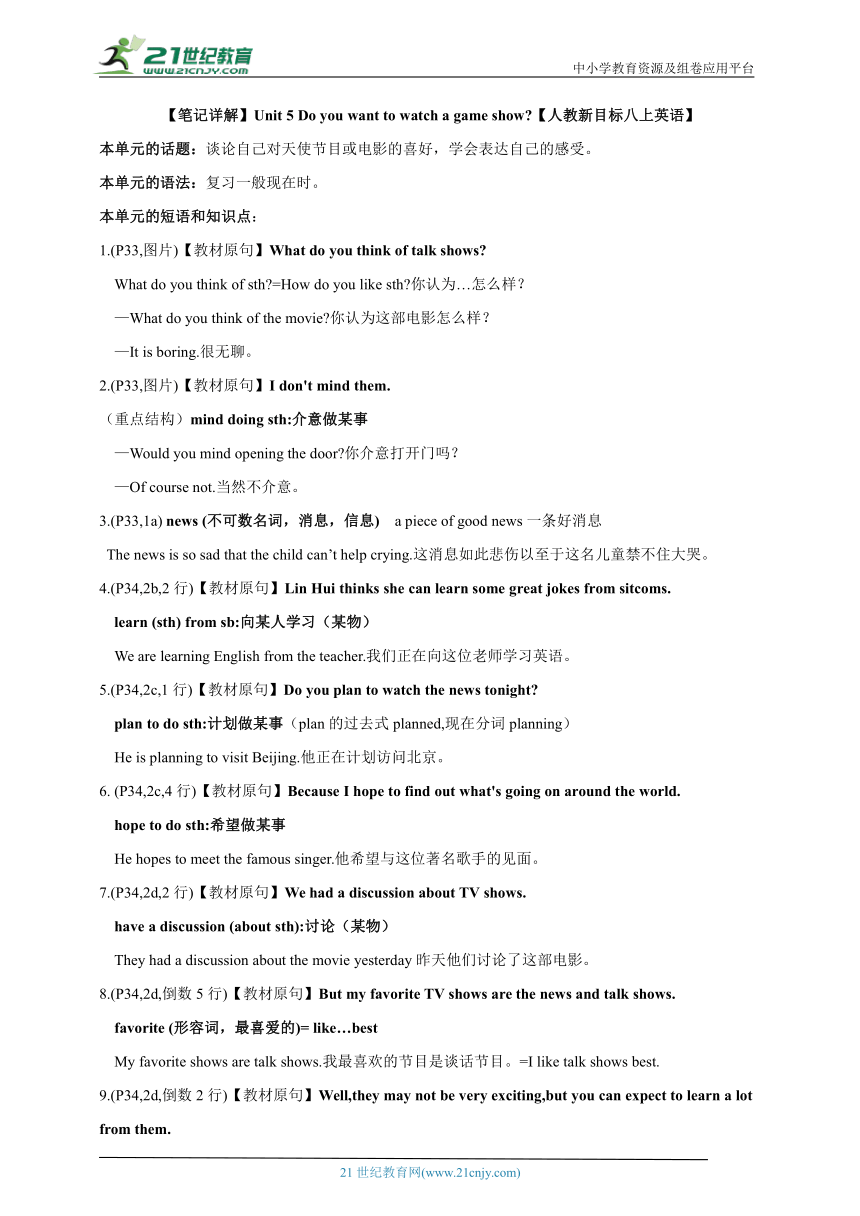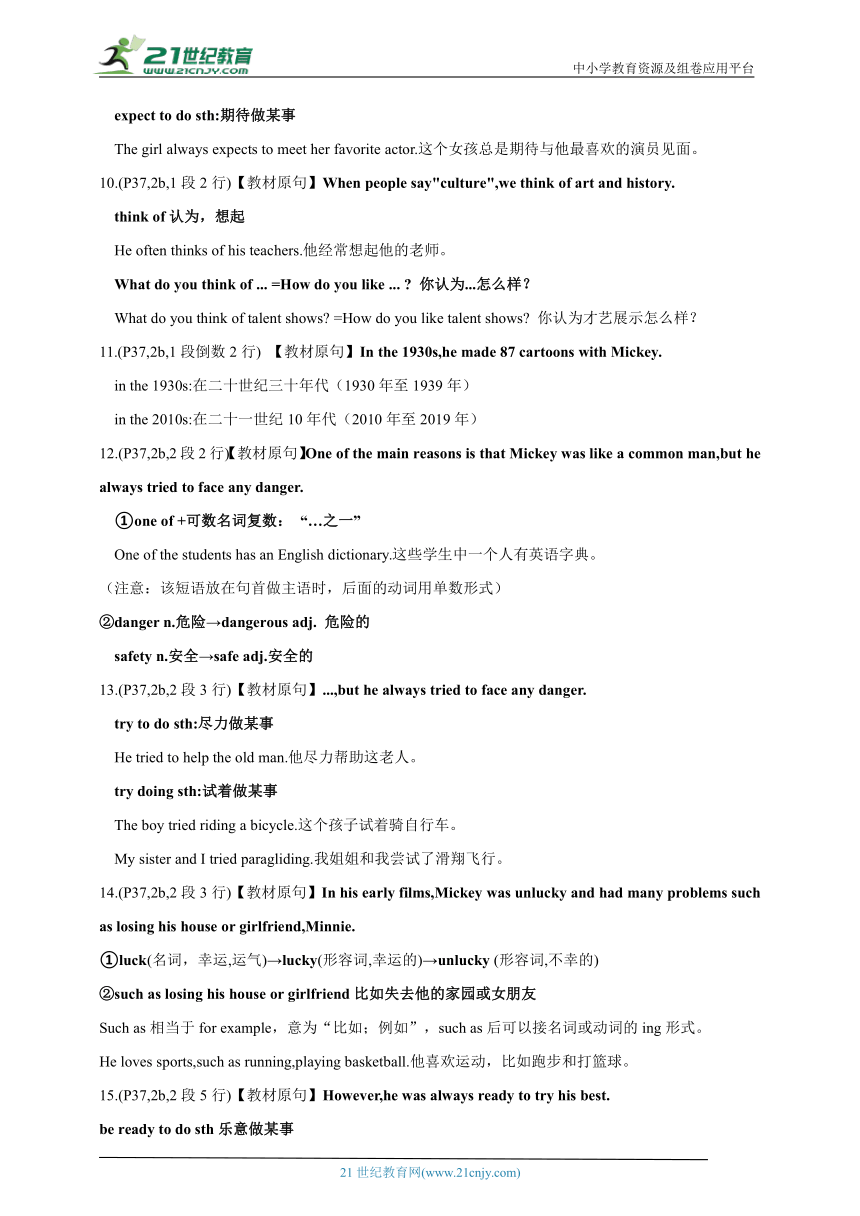【笔记详解】Unit 5 Do you want to watch a game show?【人教新目标八上英语】
文档属性
| 名称 | 【笔记详解】Unit 5 Do you want to watch a game show?【人教新目标八上英语】 |  | |
| 格式 | docx | ||
| 文件大小 | 865.9KB | ||
| 资源类型 | 试卷 | ||
| 版本资源 | 人教新目标(Go for it)版 | ||
| 科目 | 英语 | ||
| 更新时间 | 2024-10-11 19:37:19 | ||
图片预览


文档简介
中小学教育资源及组卷应用平台
【笔记详解】Unit 5 Do you want to watch a game show 【人教新目标八上英语】
本单元的话题:谈论自己对天使节目或电影的喜好,学会表达自己的感受。
本单元的语法:复习一般现在时。
本单元的短语和知识点:
1.(P33,图片)【教材原句】What do you think of talk shows
What do you think of sth =How do you like sth 你认为…怎么样?
—What do you think of the movie 你认为这部电影怎么样?
—It is boring.很无聊。
2.(P33,图片)【教材原句】I don't mind them.
(重点结构)mind doing sth:介意做某事
—Would you mind opening the door 你介意打开门吗?
—Of course not.当然不介意。
3.(P33,1a) news (不可数名词,消息,信息) a piece of good news一条好消息
The news is so sad that the child can’t help crying.这消息如此悲伤以至于这名儿童禁不住大哭。
4.(P34,2b,2行)【教材原句】Lin Hui thinks she can learn some great jokes from sitcoms.
learn (sth) from sb:向某人学习(某物)
We are learning English from the teacher.我们正在向这位老师学习英语。
5.(P34,2c,1行)【教材原句】Do you plan to watch the news tonight
plan to do sth:计划做某事(plan的过去式planned,现在分词planning)
He is planning to visit Beijing.他正在计划访问北京。
(P34,2c,4行)【教材原句】Because I hope to find out what's going on around the world.
hope to do sth:希望做某事
He hopes to meet the famous singer.他希望与这位著名歌手的见面。
7.(P34,2d,2行)【教材原句】We had a discussion about TV shows.
have a discussion (about sth):讨论(某物)
They had a discussion about the movie yesterday昨天他们讨论了这部电影。
8.(P34,2d,倒数5行)【教材原句】But my favorite TV shows are the news and talk shows.
favorite (形容词,最喜爱的)= like…best
My favorite shows are talk shows.我最喜欢的节目是谈话节目。=I like talk shows best.
9.(P34,2d,倒数2行)【教材原句】Well,they may not be very exciting,but you can expect to learn a lot from them.
expect to do sth:期待做某事
The girl always expects to meet her favorite actor.这个女孩总是期待与他最喜欢的演员见面。
10.(P37,2b,1段2行)【教材原句】When people say"culture",we think of art and history.
think of认为,想起
He often thinks of his teachers.他经常想起他的老师。
What do you think of ... =How do you like ... 你认为...怎么样?
What do you think of talent shows =How do you like talent shows 你认为才艺展示怎么样?
11.(P37,2b,1段倒数2行) 【教材原句】In the 1930s,he made 87 cartoons with Mickey.
in the 1930s:在二十世纪三十年代(1930年至1939年)
in the 2010s:在二十一世纪10年代(2010年至2019年)
12.(P37,2b,2段2行)【教材原句】One of the main reasons is that Mickey was like a common man,but he always tried to face any danger.
①one of +可数名词复数: “…之一”
One of the students has an English dictionary.这些学生中一个人有英语字典。
(注意:该短语放在句首做主语时,后面的动词用单数形式)
②danger n.危险→dangerous adj. 危险的
safety n.安全→safe adj.安全的
13.(P37,2b,2段3行)【教材原句】...,but he always tried to face any danger.
try to do sth:尽力做某事
He tried to help the old man.他尽力帮助这老人。
try doing sth:试着做某事
The boy tried riding a bicycle.这个孩子试着骑自行车。
My sister and I tried paragliding.我姐姐和我尝试了滑翔飞行。
14.(P37,2b,2段3行)【教材原句】In his early films,Mickey was unlucky and had many problems such as losing his house or girlfriend,Minnie.
①luck(名词,幸运,运气)→lucky(形容词,幸运的)→unlucky (形容词,不幸的)
②such as losing his house or girlfriend比如失去他的家园或女朋友
Such as相当于for example,意为“比如;例如”,such as后可以接名词或动词的ing形式。
He loves sports,such as running,playing basketball.他喜欢运动,比如跑步和打篮球。
15.(P37,2b,2段5行)【教材原句】However,he was always ready to try his best.
be ready to do sth乐意做某事
He is always ready to help others.他总是乐于助人。
16.(P37,2b,2段5行)【教材原句】However,he was always ready to try his best.
try one’s best(to do sth):尽力(做某事)
He often tries his best to help me.他总是尽力帮助我。
17.(P37,2b,2段5行)【教材原句】People went to the cinema to see the “little man”win.
see sb. do sth.看见某人做了某事。强调某人做某事的整个过程
I saw him work in the garden yesterday.昨天我看见他在花园里干活了。(强调看到他在花园里干活的全过程)
see sb. doing sth.看见某人正在做某事。强调某人正在做某事,即“看”和某人“做”两个动作同步进行。
I saw him working in the garden yesterday.昨天我看见他正在花园里干活。(强调我看到时“干活”的动作正在进行)
18.(P39,3a,3行)【教材原句】She dresses up like a boy and takes her father's place to fight in the army.
take one’s place:代替,替换 (take的过去式为took)
Our English teacher wasn’t at school,Mr. Wang took her place to teach us English.
我们英语老师不在学校,王老师代替她教我们英语。
单元语法:动词不定式作宾语
1.动词不定式的形式
动词不定式的形式有两种:带to的不定式和不带to的不定式。动词不定式(短语)在句中没有人 称和数的变化,其否定形式为直接在不定式符号to 前加not.
Tara wants to play tennis after school.塔拉放学后想打网球。 Mr.Depp's joke made us laugh.德普先生的笑话让我们大笑。
We decided not to go swimming in the river.我们决定不去那条河里游泳。
2.动词不定式的作用
动词不定式和其后面的名词等构成不定式短语,在句子中可以用作主语、宾语、宾语补足语、表 语、定语、状语等。本单元我们重点学习动词不定式作宾语的情况。
3.常见接动词不定式作宾语的动词(短语)
agree,choose,decide,fail,hope,plan,would like等动词(短语)后跟动词不定式作宾语。 We'd like to go to Hong Kong tomorrow. 我们想明天去香港。
ask,learn,show,teach,know等动词后可以用“疑问词+动词不定式”结构作宾语 Can you teach me how to play the piano 你能教我怎样弹钢琴吗
like,love,begin,start等词后既可以跟动词不定式,也可以跟动词-ing形式作宾语,意义差别不大。 I like singing,but I don't like to sing the song. 我喜欢唱歌,但是我不喜欢唱这首歌。
“find/think/feel+it+adj.+动词不定式(短语)” 结构,其中it为形式宾语,动词不定式(短语)为真正的宾语 I find it difficult to learn a language well. 我发现学好一门语言很难。
forget,remember,stop,try等动词后既可以跟动词不定式,也可以跟动词-ing形式,但是意义不同。 I'm tired.Let's stop to have a rest. 我累了。让我们停下来休息一下吧。 It's time for class.Please stop talking! 上课了。请别讲话。
拓展:动词不定式(短语)作其他句子成分的常考点
(1)动词不定式(短语)作主语,此时常用it作形式主语,而把动词不定式(短语)放在句子的后面。
It's very important to learn English well.=To learn English well is very important.学好英语很重要。
(2)动词不定式作定语,常用来修饰名词或不定代词,放于所修饰的词后,为后置定语。
I'd like something to drink.我想要些喝的东西。
(3)动词不定式(短语)作状语,常用在go,come,hurry等不及物动词后,表目的。
I will go to see him tomorrow.我明天将去看他。
(4)动词不定式(短语)作宾语补足语,表示宾语经常或一次性完成的动作。常见的动词不定式 (短语)作宾语补足语有两种形式:带to 的不定式和不带to 的不定式。
My teacher told us to study hard.我的老师告诉我们要努力学习。
Nelly often hears her sister practice singing.内莉经常听见妹妹(姐姐)练习唱歌。
21世纪教育网(www.21cnjy.com)
【笔记详解】Unit 5 Do you want to watch a game show 【人教新目标八上英语】
本单元的话题:谈论自己对天使节目或电影的喜好,学会表达自己的感受。
本单元的语法:复习一般现在时。
本单元的短语和知识点:
1.(P33,图片)【教材原句】What do you think of talk shows
What do you think of sth =How do you like sth 你认为…怎么样?
—What do you think of the movie 你认为这部电影怎么样?
—It is boring.很无聊。
2.(P33,图片)【教材原句】I don't mind them.
(重点结构)mind doing sth:介意做某事
—Would you mind opening the door 你介意打开门吗?
—Of course not.当然不介意。
3.(P33,1a) news (不可数名词,消息,信息) a piece of good news一条好消息
The news is so sad that the child can’t help crying.这消息如此悲伤以至于这名儿童禁不住大哭。
4.(P34,2b,2行)【教材原句】Lin Hui thinks she can learn some great jokes from sitcoms.
learn (sth) from sb:向某人学习(某物)
We are learning English from the teacher.我们正在向这位老师学习英语。
5.(P34,2c,1行)【教材原句】Do you plan to watch the news tonight
plan to do sth:计划做某事(plan的过去式planned,现在分词planning)
He is planning to visit Beijing.他正在计划访问北京。
(P34,2c,4行)【教材原句】Because I hope to find out what's going on around the world.
hope to do sth:希望做某事
He hopes to meet the famous singer.他希望与这位著名歌手的见面。
7.(P34,2d,2行)【教材原句】We had a discussion about TV shows.
have a discussion (about sth):讨论(某物)
They had a discussion about the movie yesterday昨天他们讨论了这部电影。
8.(P34,2d,倒数5行)【教材原句】But my favorite TV shows are the news and talk shows.
favorite (形容词,最喜爱的)= like…best
My favorite shows are talk shows.我最喜欢的节目是谈话节目。=I like talk shows best.
9.(P34,2d,倒数2行)【教材原句】Well,they may not be very exciting,but you can expect to learn a lot from them.
expect to do sth:期待做某事
The girl always expects to meet her favorite actor.这个女孩总是期待与他最喜欢的演员见面。
10.(P37,2b,1段2行)【教材原句】When people say"culture",we think of art and history.
think of认为,想起
He often thinks of his teachers.他经常想起他的老师。
What do you think of ... =How do you like ... 你认为...怎么样?
What do you think of talent shows =How do you like talent shows 你认为才艺展示怎么样?
11.(P37,2b,1段倒数2行) 【教材原句】In the 1930s,he made 87 cartoons with Mickey.
in the 1930s:在二十世纪三十年代(1930年至1939年)
in the 2010s:在二十一世纪10年代(2010年至2019年)
12.(P37,2b,2段2行)【教材原句】One of the main reasons is that Mickey was like a common man,but he always tried to face any danger.
①one of +可数名词复数: “…之一”
One of the students has an English dictionary.这些学生中一个人有英语字典。
(注意:该短语放在句首做主语时,后面的动词用单数形式)
②danger n.危险→dangerous adj. 危险的
safety n.安全→safe adj.安全的
13.(P37,2b,2段3行)【教材原句】...,but he always tried to face any danger.
try to do sth:尽力做某事
He tried to help the old man.他尽力帮助这老人。
try doing sth:试着做某事
The boy tried riding a bicycle.这个孩子试着骑自行车。
My sister and I tried paragliding.我姐姐和我尝试了滑翔飞行。
14.(P37,2b,2段3行)【教材原句】In his early films,Mickey was unlucky and had many problems such as losing his house or girlfriend,Minnie.
①luck(名词,幸运,运气)→lucky(形容词,幸运的)→unlucky (形容词,不幸的)
②such as losing his house or girlfriend比如失去他的家园或女朋友
Such as相当于for example,意为“比如;例如”,such as后可以接名词或动词的ing形式。
He loves sports,such as running,playing basketball.他喜欢运动,比如跑步和打篮球。
15.(P37,2b,2段5行)【教材原句】However,he was always ready to try his best.
be ready to do sth乐意做某事
He is always ready to help others.他总是乐于助人。
16.(P37,2b,2段5行)【教材原句】However,he was always ready to try his best.
try one’s best(to do sth):尽力(做某事)
He often tries his best to help me.他总是尽力帮助我。
17.(P37,2b,2段5行)【教材原句】People went to the cinema to see the “little man”win.
see sb. do sth.看见某人做了某事。强调某人做某事的整个过程
I saw him work in the garden yesterday.昨天我看见他在花园里干活了。(强调看到他在花园里干活的全过程)
see sb. doing sth.看见某人正在做某事。强调某人正在做某事,即“看”和某人“做”两个动作同步进行。
I saw him working in the garden yesterday.昨天我看见他正在花园里干活。(强调我看到时“干活”的动作正在进行)
18.(P39,3a,3行)【教材原句】She dresses up like a boy and takes her father's place to fight in the army.
take one’s place:代替,替换 (take的过去式为took)
Our English teacher wasn’t at school,Mr. Wang took her place to teach us English.
我们英语老师不在学校,王老师代替她教我们英语。
单元语法:动词不定式作宾语
1.动词不定式的形式
动词不定式的形式有两种:带to的不定式和不带to的不定式。动词不定式(短语)在句中没有人 称和数的变化,其否定形式为直接在不定式符号to 前加not.
Tara wants to play tennis after school.塔拉放学后想打网球。 Mr.Depp's joke made us laugh.德普先生的笑话让我们大笑。
We decided not to go swimming in the river.我们决定不去那条河里游泳。
2.动词不定式的作用
动词不定式和其后面的名词等构成不定式短语,在句子中可以用作主语、宾语、宾语补足语、表 语、定语、状语等。本单元我们重点学习动词不定式作宾语的情况。
3.常见接动词不定式作宾语的动词(短语)
agree,choose,decide,fail,hope,plan,would like等动词(短语)后跟动词不定式作宾语。 We'd like to go to Hong Kong tomorrow. 我们想明天去香港。
ask,learn,show,teach,know等动词后可以用“疑问词+动词不定式”结构作宾语 Can you teach me how to play the piano 你能教我怎样弹钢琴吗
like,love,begin,start等词后既可以跟动词不定式,也可以跟动词-ing形式作宾语,意义差别不大。 I like singing,but I don't like to sing the song. 我喜欢唱歌,但是我不喜欢唱这首歌。
“find/think/feel+it+adj.+动词不定式(短语)” 结构,其中it为形式宾语,动词不定式(短语)为真正的宾语 I find it difficult to learn a language well. 我发现学好一门语言很难。
forget,remember,stop,try等动词后既可以跟动词不定式,也可以跟动词-ing形式,但是意义不同。 I'm tired.Let's stop to have a rest. 我累了。让我们停下来休息一下吧。 It's time for class.Please stop talking! 上课了。请别讲话。
拓展:动词不定式(短语)作其他句子成分的常考点
(1)动词不定式(短语)作主语,此时常用it作形式主语,而把动词不定式(短语)放在句子的后面。
It's very important to learn English well.=To learn English well is very important.学好英语很重要。
(2)动词不定式作定语,常用来修饰名词或不定代词,放于所修饰的词后,为后置定语。
I'd like something to drink.我想要些喝的东西。
(3)动词不定式(短语)作状语,常用在go,come,hurry等不及物动词后,表目的。
I will go to see him tomorrow.我明天将去看他。
(4)动词不定式(短语)作宾语补足语,表示宾语经常或一次性完成的动作。常见的动词不定式 (短语)作宾语补足语有两种形式:带to 的不定式和不带to 的不定式。
My teacher told us to study hard.我的老师告诉我们要努力学习。
Nelly often hears her sister practice singing.内莉经常听见妹妹(姐姐)练习唱歌。
21世纪教育网(www.21cnjy.com)
同课章节目录
- Unit 1 Where did you go on vacation?
- Section A
- Section B
- Unit 2 How often do you exercise?
- Section A
- Section B
- Unit 3 I'm more outgoing than my sister.
- Section A
- Section B
- Unit 4 What's the best movie theater?
- Section A
- Section B
- Unit 5 Do you want to watch a game show?
- Section A
- Section B
- Unit 6 I'm going to study computer science.
- Section A
- Section B
- Unit 7 Will people have robots?
- Section A
- Section B
- Unit 8 How do you make a banana milk shake?
- Section A
- Section B
- Unit 9 Can you come to my party?
- Section A
- Section B
- Unit 10 If you go to the party, you'll have a grea
- Section A
- Section B
